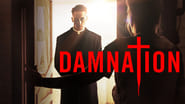karenholmes-04495
I measure how well done a show is by whether or not I think about it in the days between episodes. This is one of those rare shows that caused me to think about it with anticipation. Damnation will definitely be on my short list of new favorites. The character development drives the story. I took off a star because the pacing wasn't perfect, but for the most part it was spot on. I do not usually review shows, but I decided to review this one because I was surprised that the overall user rating was so low for the quality of the series. As I suspected, when I read other user reviews I saw that they lowballed it because they do not agree with the political slant, as a result it jaundiced the overall rating. The acting was well done, the cinematography is first rate, I adored the costuming and sets. Basically, I do not understand how anyone could give this show a 1 star because they do not agree with the politics. Do yourself a favor and watch for yourself and decide, unless of course you are too much of a snowflake to watch programming that disagrees with your political views.
davidtalburtt
If you liked "Deadwood" you might like "Damnation." Both "Damnation" and "Deadwood" are about power politics and corruption in western settings, "Deadwood" being set in the 19th Century Gilded Age in South Dakota, "Damnation" set in rural Iowa during the Great Depression (1931). FYI, the writers and director of "Damnation" have worked on projects like "Longmire" and "Office Space." The writing is well done (if brutal), and the acting excellent. Filmed in Calgary, Alberta, the scenery passes well enough for some parts of Iowa.One of the differences between the two series is that "Damnation" is, while set in the past, deliberately intends to comment on our current state of affairs in the early 21st Century. The 1930's, like our time now, was a time when the economy failed millions, institutions such as the press, law enforcement and the courts appeared to have been corrupted, and the answers to these problems seemed they could only be solved by revolutions either by the extreme right or the extreme left. The comparisons can be taken a little far: one character, representing the "Big Business" interests coming after the small farmers, reveals that the interests he represents wants to eventually kick the farmers off their land to not only mechanize agriculture, but also mechanize factories and warfare (I think with our fears of Artificial Intelligence, this is more a fear of our time than the 1930's).Another difference between "Deadwood" and "Damnation" is that the ruthless business interests are actively being opposed. The farmers are attempting to unionize and strike to protect themselves (though two of the main characters, who are the main labor organizers, would likely really prefer a workers revolution). Also, media like the investigative press and radio may also end up playing part in opposing "Big Business" and their enforcers. So far however, the local paper in "Damnation" is covering up the attempt to drive the small farmers off their land by price fixing and violence by strikebreakers. The USA Network provides excellent video interviews with the director and writers, who make clear this is their intent. "To understand the present, go back to the past," one of the writers says, or that the series, while set in the 1930's "Mirrors the Past (director Adam Kane)." USA also provides a couple of good mini-documentaries "Legacy of the Heartland: The One Thousand" and "Legacy of the Heartland: War of Words." The documentaries and the interviews put the characters and the action in better context, and really make this interesting, well thought out series more understandable.







